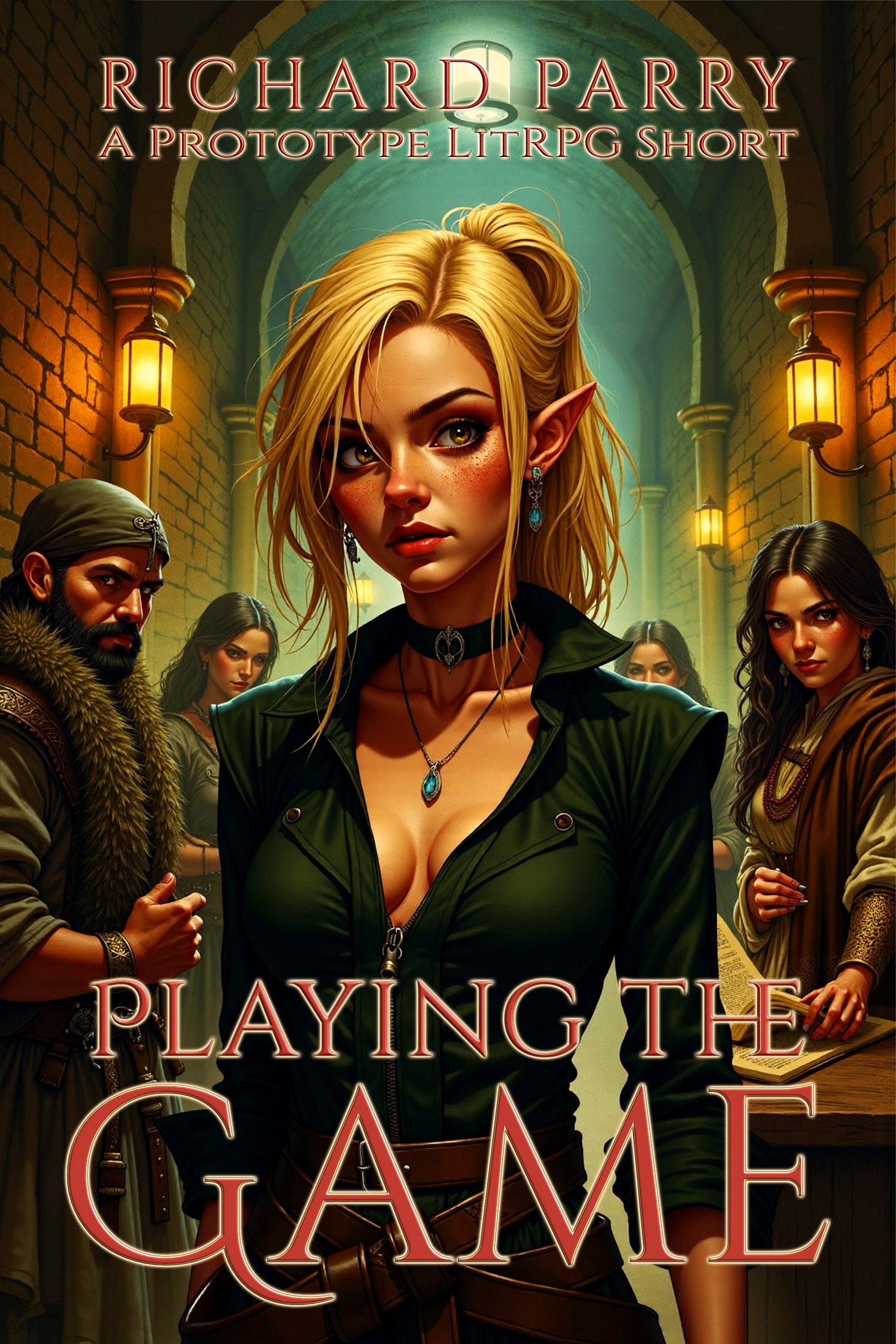Writing LitRPG can be fun. You essentially get to play-act as a developer (either of tabletop or computer games) without having to put in years of work in another profession. You also get to create immersive worlds, craft intricate levelling systems, and finally give your meticulously built setting the starring role it deserves. What’s not to like?
But there’s a trap: get too wrapped up in mechanics and you forget to tell a story, or put characters in it.
If you’re afraid your book reads more like patch notes than a novel, you’ve got yourself a problem. If your protagonist spends more time explaining their inventory than actually using it, you might be entering the new genre of spreadsheet fiction.
So how do you write LitRPG that’s engaging, immersive, and doesn’t drown in stats? Let’s pick-a-path to victory.
This is Part 2 of a 3-part series on LitRPG: its origins, how to write it, and why it works.
LitRPG is fun until it turns into a wiki page masquerading as a novel. Want to write a game-driven story that readers actually care about? Here’s how to balance mechanics with storytelling.
Missed Part 1? Here it is:
Next: Overthinking: Is LitRPG Just Escapism, or Something Deeper? – where we get deep and metaphysical on why this genre is so damn addictive:
Balancing Mechanics & Story: Avoiding Spreadsheet Fiction
The core issue is that many writers get too caught up in game systems at the expense of plot. That WorldAnvil you put together to support the story becomes the story, and hard truth time: it’s not really as interesting as you think it is.
The mistake is that some LitRPG books read like you’ve accidentally picked up the game’s wiki instead of the actual story. I get it: stats, skills, and crafting trees are fun to build. But if your readers are wading through 50 pages of skill descriptions before anything happens, you’ve lost them. You should never have to explain any of this shit to them, because, like urban fantasy, they already come equipped with half the worldbuilding done for you. They have an internalised knowledge of what games are and how they work.
It’s worth noting, though, that a growing number of LitRPG works are flipping the script, learning from the older classics and melding familiar game mechanics with layered storytelling that questions the very nature of power and success. It’s these examples that give us our method for not falling into the same spike trap.
The fix is to use stats like seasoning, not the main course. A few lines of skill progression are fine, but don’t let it hijack the story. Readers love personalised and contextual narratives and don’t immediately attach to numbers, so onstead of listing “Strength +3, Dexterity +2,” show the impact: “He swung harder than before, his strike landing with enough force to send the goblin skidding backward.”
And crucially, interrogate yourself like you’re in Guantanamo Bay. Does what you’re doing advance the story? If your character is choosing a skill upgrade, make it mean something for character growth, strategy, or an upcoming challenge. There should be consequences and challenges for every decision, otherwise there are no stakes.
Worldbuilding: Making Game Elements Feel Organic
The world should feel like it exists beyond the protagonist’s UI.
The mistake a lot of LitRPG books make is that they feel like the game world was built five minutes before the protagonist logged in. NPCs exist to hand out quests, towns are just quest hubs, and the world lacks a lived-in feel, almost as if it’s running in screensaver mode.
The fix is to give the world a life of its own. NPCs should have agendas, personalities, and quirks. Maybe the blacksmith’s got gambling debts, or the innkeeper secretly funds a rebellion. This should lead you think beyond the quest log. Make the setting feel alive by including details that don’t directly serve the protagonist’s immediate goals. Use quirks like game bugs in the code to enhance the realism for the players-slash-heroes. And don’t forget that consistency matters. If magic requires mana, don’t let your hero spam fireballs without consequence. If the game’s economy is built on rare loot, don’t let them accidentally break it by farming gold or items and escaping the world’s gravity well and into OP orbit.
Here’s a quick example:
“The town had an item shop. When I entered, the owner wasn’t waiting for me with a ? above her head. She was balls-deep in an argument with her iron supplier about the price. I heard her rage that some new dungeon drop was tanking prices. What should I do? Go Karen my way into her grill or wait it out? I wasn’t the main character in her story. I was just another customer.”
Character Growth & Player Agency: Writing Protagonists Who Aren’t Just Avatars
Your hero needs to be more than just a walking set of stats.
The mistake is that some LitRPG protagonists feel like cardboard cutouts. They exist to gain XP, get loot, and exploit mechanics. They don’t have goals, flaws, or personalities beyond “win game, get stronger.”
The Fix is easy: give them personal stakes. Why is your protagonist here? Are they trapped? Seeking revenge? Trying to protect someone? Their arc should be more than just getting to max level. Their choices should matter. Let them struggle to find the optimal strategy. Maybe the best skill upgrade requires betraying an ally, or the best loot comes at the cost of public trust. Does this provide an angle for a moral dilemma? Flaws make heroes interesting. A protagonist who never struggles, never doubts, and always wins with perfect efficiency isn’t a character—they’re a caricature, a power fantasy checklist.
Some contemporary LitRPGs intentionally embrace these tropes as a backdrop to explore themes of sacrifice and the hidden costs of power, which deepens the narrative in unexpected ways.
Here’s a quick example:
“The +5 Sword of Infinite Destruction made my palms itch when I held it. This could short-circuit my fight with Grondar the Invincible, because we all want to know what happens when the infinite meets the invincible. But… it belonged to the warrior father of Meredith, and I was really hoping to meet her. In the real, you know? Should I keep it? I’d never shake the feeling I’d stolen something that wasn’t mine. And Meredith would know.”
Common Pitfalls & How to Avoid Them
Avoiding the most common writing sins of the genre can be done with a quick checklist.
Avoid info-dumps:
🚨 Red flag: “Here’s a 3,000-word breakdown of the game’s economy before the first quest.”
✅ Fix: Give players just enough to understand what’s happening. Readers will pick up the rules as they go, just like in real games.
Jettison your OP MC:
🚨 Red flag: “By Chapter Two, I had unlocked Ultimate God Mode and one-shot the Demon Lord.”
✅ Fix: Struggles create tension. Make power gains feel earned, not just handed out for free. The Demon Lord is a chapter five victory at best.
Stop the repetitive grind sequences:
🚨 Red flag: “I spent five chapters farming boars for XP.”
If your protagonist needs to grind, fine. But unless they’re training with a Jedi master or making a Faustian pact, we don’t need to see it.
Example:
“Three days of training later, my legs felt like lead, but my dodges were faster. No more taking fireballs to the face for me, once I could walk without wincing.”
Conclusion: LitRPG Is a Game… Make It a Good One
Writing LitRPG is a balancing act—mechanics should enhance the story, not replace it. Your world should feel alive, your protagonist should have real stakes, and your pacing should keep things moving.
Your TL;DR:
Mechanics should serve the story, not dominate it.
Worldbuilding should feel lived-in, not like a backdrop.
Characters should have goals, flaws, and actual choices.
So, if you’re writing LitRPG, remember: readers aren’t here just for stats and skill trees. They want a great story. Don’t lose sight of it. And if you want to read my painful, cringeworthy first attempt at LitRPG, click below. Warning: I wrote this when I was fifteen, so it will be actively hostile to everything you hold dear as a writer:
[https://bf.parrydox.com/xcja1zlbxw]
Now go forth and write a book that makes people care about more than just the XP bar.
It’s your turn. What’s your biggest LitRPG pet peeve? Too many stat dumps? OP protagonists with no struggle? Rant along with me in the comments. And if you liked this, ring the Like Button of Glamour, or…
If you’re feeling generous, toss a coin to this witcher on Ko-fi. It’s like a posthumous bribe for writing just what you needed.
Continue this series: Overthinking, but Professionally: Is LitRPG Just Escapism, or Something Deeper? Now we’ve talked about how to write it, we can get into why it hits so hard. I’m breaking down what makes LitRPG resonate beyond just wish-fulfilment:








